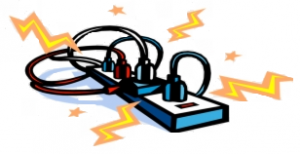This page is coming soon
Make sure you carry out a continuous fire risk assessment of your building ensuring the following points are followed:
Download the documents below for assistance with completing your risk assessment:
 Blank Fire Risk Assessment Proforma (PDF 117KB)
Blank Fire Risk Assessment Proforma (PDF 117KB) Fire Risk Assessment (worked example for office premises (PDF 462KB)
Fire Risk Assessment (worked example for office premises (PDF 462KB) Fire Risk Assessment (worked example for House in Multiple Occupation (HMO)) (PDF 389KB)
Fire Risk Assessment (worked example for House in Multiple Occupation (HMO)) (PDF 389KB)If you feel, having read the guidance, that you:
You will need to appoint a specialist to carry out the risk assessment for you. Such a specialist must identify the fire safety measures that need to be in place. You should maintain close involvement in the process.
The Fire Risk Assessment Competency Council have produced a document (Guidance Choosing a Competent Fire Risk Assessor) for information on how to select an appropriate person or organisation to carry out the risk assessment on your behalf.
The guide and other helpful documents are available via the link below:

Don’t leave candles burning when you leave the room.
You should always keep an eye on naked flames wherever they are!
Faulty electrics (appliances, wiring and overloaded sockets) cause around 6,000 fires in the home across the country every year. For some handy tips, watch the following short video (courtesy of Cheshire Fire and Rescue Service):
How to avoid electrical fires
An extension lead or adaptor will have a limit to how many amps it can take, so be careful not to overload them to reduce the risk of a fire, try and keep to one plug per socket. Appliances use different amounts of power – a television may use a 3 Amp plug and a vacuum cleaner a 5 Amp plug for example. To check if your plug sockets are overloaded use the handy socket calculator.
The most common cause of fire death in the home is smoking. If you or someone in your home smokes, there are a number of simple steps you can take to prevent a fire from happening in your home:
Fire safety tips for smokers
E-cigarettes fire safety tips
There have been a number of incidents in the UK caused by e-cigarettes or their chargers. To help reduce the risk, follow these safety tips:
If you’re at home more currently due to working from home, an illness or self-isolating, please take extra care when you’re cooking, around half of home fires are caused by cooking accidents.
Here are some tips to prevent them and to keep you safe. If you are concerned that you or a family member are becoming forgetful or confused about cooking, we can give you further advice. Please visit our home safety visits page for more information on how you can carry out your own home safety check or how you can arrange for one of our home safety check visits. A helpful video has been provided by our colleagues at Cheshire Fire and Rescue Service on how to stay safe whilst cooking.
Applications will only be considered if all of the following criteria are met:
Please note: If you are successful and do not possess the requisite qualifications in Maths and English, you will be supported and required to undertake the level 2 Maths and English qualification. You will also need to study for and pass the Institute of Fire Engineering (IFE) level 2 Operations Exams.
View our comprehensive FAQs on full time firefighter recruitment by clicking here.
Stage 1 – Initial application form
The first stage of our recruitment process is for applicants to complete an initial application form which will be available on our website once the recruitment campaign has commenced. This will include a behavioural questionnaire and a situational judgement test.
Stage 2 – Online assessments
On successfully passing stage 1, applicants will progress to undertake the following online assessments:
Stage 3 – Job Related Tests (JRTs)
On successfully passing stage 2, applicants will progress to undertake JRTs which may comprise of the following:
More details on the above tests are available on our website.
Stage 4 – Interview
On successfully passing stage 3, applicants will be invited to an interview which will focus on the following:
Stage 5 – Medicals/fitness test
On successfully passing stage 4, applicants will be required to attend a medical and fitness test with our Occupational Health provider.
Stage 6 – Disclosure and Barring Service (DBS) and employment checks
Before an offer of employment is confirmed, the Service will apply for a DBS check. Pre-employment background checks will also be requested such as references and eligibility to work in the UK.
Please note: If you are successful and do not possess the requisite qualifications in Maths and English, you will be supported and required to undertake the level 2 Maths and English qualification. You will also need to study for and pass Institute of the Fire Engineering (IFE) level 2 Operations Exams.
The role of a firefighter is far more than just responding to fires and other emergencies, such as animal rescues, flooding and water rescue incidents.
Providing education programmes and safety messages to local schools, businesses, community groups and residents is an essential part of the firefighter’s role in helping to prevent accidents and limiting the injury potential of those that do occur.
Following initial training, firefighters undertake continuous development training and have the opportunity to train for different skill sets.
For information visit the Fire Service website.
Below are descriptions of the JRTs that you may be asked to complete as part of the recruitment process:
Breathing Apparatus (BA)
Casualty evacuation
Dead lift
Equipment assembly
Equipment carry
Hose running
Ladder ascent
Ladder extension
Ladder lift
Non-assessable ladder extension
Click on the links below to find out more about our recommended fitness and exercise routines:
Understanding the fitness programme
Building up a foundation
Developing your strength
Getting stronger and increasing conditioning
Reducing the risk of injury when exercising
When it comes to caring for the local community, on-call firefighter Ashley Hunt is an example of someone who has really gone the extra mile.
The 29-year-old not only carries out on-call firefighting duties at Earls Barton and Wellingborough Fire Stations, but he does all of this alongside his other busy role as a manager at Morrison’s Supermarket.
When the first pandemic lockdown happened, Ashley went even further in his duties as an on-call firefighter, by volunteering to take on the extra roles of ambulance driving and pharmacy deliveries to those shielding.
Ashley joined Northamptonshire Fire and Rescue Service (NFRS) four years ago, having been inspired by two members of his own family.
He said: “My uncle was a wholetime firefighter at Mereway and my dad was an on-call firefighter at Wellingborough. I definitely looked up to them.” Ashley said that some of his earliest memories were of his father responding to calls and it was his care for the community that drove him to follow in his footsteps.
Taking on extra duties during the pandemic was something that seemed a natural step for Ashley.
“I wanted to provide this extra support as I just wanted to do what I could to help people during the pandemic, and I wanted to learn more about joint working, working alongside other organisations such as ambulances and I wanted to help other services. I wanted to become more knowledgeable about what others were doing and how they were supporting the pandemic.”
Ashley appreciated the learning opportunities he was given through working so closely with other organisations as an on-call firefighter. Being able to do something for shielding patients who were so isolated from other people was also something he found rewarding.
He said: “Helping people when they need us and seeing how grateful they are for that help is very rewarding.”
With support from his employers at Morrison’s, balancing supermarket duties with work as an on-call firefighter has been straightforward.
He said: “Balancing my work at Morrison’s has been made easier by the fact I have a very supportive manager and he allows me to support my community. We have been busy with the pandemic, but he has allowed me to stay available as much as I possibly can.”
For anyone thinking about becoming an on-call firefighter, Ashley has some words of advice.
“If you think you would like to support your community by becoming an on-call firefighter, just do it. You are fully trained to attend everything from road traffic collisions to fires and there are few other jobs like it. It is a paid role you can take on alongside another job, but it is rewarding in many other ways too, in the work you are able to carry out to keep people in your community safe.”
Green-fingered Helen Pilkington is one of the most recent on-call firefighters to join Northamptonshire Fire and Rescue Service, balancing this work with her “day job” as a gardener.
Helen, who supports Rothwell Fire Station, joined the Service in 2019; little knowing her first year would be quite an eventful one for the service, and the country as a whole.
But during the pandemic, Helen carried out extra duties as part of her work as an on-call firefighter, making pharmaceutical deliveries to shielding patients and carrying out ambulance driving for East Midlands Ambulance Service.
She said: “Working within the community, people are always grateful we are there and it is rewarding. With the pharmacy runs, we dropped off medicines for people who couldn’t get out of their houses. They were really grateful.
I also started doing the ambulance driving, which was organised through the Fire Service and East Midlands Ambulance Service. We are all helping each other out.
It was something I thought would be possible now I had extra time off work throughout lockdown. I am trained now in immediate emergency care through my role at the fire service and thought this would be an opportunity to utilise my time and skills for the good of the community and inter agency collaboration.
I think taking on these roles made people think about how, as firefighters, we do so much more than just put fires out.”
Helen is also a busy mum of one but when her son went to junior school she decided she would have more time to join NFRS as an on-call firefighter.
She said: “When my son joined junior school I started having more time for myself and I wanted to do something completely different. I have lived in Rothwell for six years and wanting to do something for my local community was one of the factors.
When my son was in infant school, I remember that the fire service delivered a talk to his class on ‘stop, drop and roll’, which is the advice given to people if their clothing catches fire. He came back from school and that visit made such a big impact on him. They were only there for one afternoon but he talked about it for a few weeks. This is what made me think, ‘I would like to do something like that.’”
Helen now enjoys being a trained on-call firefighter and manages to balance this well with both self-employment and parenthood.
She said: “I have loved joining the fire service as an on-call firefighter. I enjoy being part of a team. I’m self-employed so usually I work on my own all of the time. In the fire service, everyone looks after each other and there is really good team support.
Joining the Fire Service has been everything I expected it would be and more. The most challenging thing about it is the development and you are always learning but it is good for my brain.
This job really gets you out in the community and gives you a whole different perspective on how the emergency services work.
I get so much from my work with the fire service. You are giving something up, your time, to take on on-call duties but it is never a chore.”
We are currently not recruiting for full time firefighters.
Please continue to check this page for any updates relating to upcoming recruitment opportunities.
Don’t plug too many plugs into a socket.
This can cause an electrical fire.

Never touch the oven or fireplace unless a grown up is with you.

Ask a grown up to check the smoke alarms once a month.
Never take the batteries out when it goes off by accident, you might forget to put them back in.

Fires on boats have killed 30 boaters in the last 20 years. Most fires are preventable; follow our tips and advice on how to protect your boat and crew from fire, and what to do should a fire break out. The video below is courtesy of Cheshire Fire and Rescue Service:
Visit our home fire safety page for advice on how to check your home. We have a checklist available to download and you will also find how to apply for a visit should you need more help.
During the school holidays, and in particular in hot weather, an increasing number of children put themselves at risk of drowning.
To keep yourself safe, when you are in, on or beside water, always follow the Water Safety Code.
Spot the dangers! Water may look safe, but it can be dangerous. Learn to spot and keep away from dangers. You may swim well in a warm indoor pool, but that does not mean that you will be able to swim in cold water.
The dangers of water include:
Please refer to the National Water Safety Signs to help you keep safe near open water.
For further information and advice on what you should do if you do get into trouble in open water or falling through ice, please visit the sites below:
Unfortunately, the very features that provide this fast response can also produce unwanted signals arising from activities other than a real fire.
These can prove both costly both to the Fire Service, by initiating unnecessary turnouts of fire appliances and to the building operator. Evacuation of a building as a result of a false alarm signal can result in loss of production and general disruption of normal business activities.
Visit our Unwanted Fire Signals page for more details on our unwanted fire signal reduction policy.
Compliance with the simple rules below will help to release the fire service for more essential duties.
They may also help to save you from the permanent loss of business so frequently associated with a major fire.
The safety of your building and its occupants can be greatly enhanced by the installation of an Automatic Fire Detection and Alarm System. If properly used and maintained, the automatic system can be a significant factor in reducing the risk to life, and the limiting of damage to your property.
Enforcement action varies from educating and informing, notification of defects to be rectified, agreeing an action plan, an enforcement notice, an alterations notice, a prohibition notice or possible prosecution.
If you have made your assessment but we think you need to take further action, we will discuss this with you and highlight specific areas of concern.
It is, however, the responsible person’s duty to identify and take appropriate measures to comply with the Regulatory Reform (Fire Safety) Order 2005. See the Public Register of Enforcement Action.
Enforcement action varies from educating and informing, notification of defects to be rectified, agreeing an action plan, an enforcement notice, an alterations notice, a prohibition notice or possible prosecution.
If you have made your assessment but we think you need to take further action, we will discuss this with you and highlight specific areas of concern.
It is, however, the responsible person’s duty to identify and take appropriate measures to comply with the Regulatory Reform (Fire Safety) Order 2005. See the Public Register of Enforcement Action.
We have responsibility for the enforcement of the Regulatory Reform (Fire Safety) Order 2005. As part of this role we visit a number of premises to carry out a risk based inspection program.
If your premises are selected for a visit you will be required to present a fire risk assessment and emergency plan to one of our Fire Protection Officers (FPO)s and explain the contents.
If, when we visit, you have not completed a fire risk assessment you may have committed an offence under the Regulatory Reform (Fire Safety) Order 2005 which may lead to enforcement action being taken.
You can’t see it, taste it or smell it but it can kill quickly and with no warning. Unsafe gas appliances produce a highly poisonous gas called carbon monoxide (CO). It can cause death as well as serious long-term health problems such as brain damage.
Common symptoms include headaches, nausea, breathlessness, collapse, dizziness and loss of consciousness.
Carbon monoxide symptoms are similar to flu, food poisoning, viral infections and simply tiredness. That’s why it’s quite common for people to mistake this very dangerous poisoning for something else.
If you have a faulty appliance in your home, it could lead to carbon monoxide poisoning. Get it checked as soon as possible by a Gas Safe registered engineer.
For further information and to find a register of qualified gas engineers, please go to the Gas Safe website.
It it is difficult for you to fit smoke alarms yourself, ask a friend or family member to help you.
If you are a tenant and rent your property, your landlord or housing provider have a legal responsibility to ensure you have working alarms at the start of your tenancy. For more information, please read the information within the fire safety in shared or rented accommodation guidance leaflet (Gov.uk).
Strobe lighting and vibrating pad alarms are available for those who are deaf or hard of hearing. It may be useful to consider if other types of alerters would also be helpful in daily living. Alerters can often be linked to one system rather than needing lots of different pieces of equipment.
Contact the ‘Action on Hearing Loss’ information line on 0808 808 0123 or textphone 0808 808 9000 or visit their website for further information.
If you store large amounts of possessions in and around your home, it means that a fire has a greater risk of spreading, and it may be more difficult to escape quickly. You can help keep yourself safe from fire by ensuring you have a fire escape plan (see next section).
If you feel that you need some help or assistance with the above, there are many organisations that will support you through the process free of charge.
For details, go to the Help for Hoarders website where you can also download a helpful tips leaflet provided by the London Fire Brigade
You are more at risk from a fire when asleep. Most fires start in the kitchen or the lounge, so it’s a good idea to follow the bedtime checklist below before you go to sleep.
We want you, your family, friends and neighbours to be safe from fire in your home. To help you do this, watch the following short video (courtesy of Norfolk Fire and Rescue Service) which will highlight the risks in your home room by room and give you some advice on how to make it safer: Home safety video.
If you have children why not make it fun and get them to help you spot the risks so that they develop an understanding about fire safety.
Drink driving, speeding, not wearing a seatbelt and using a mobile phone while at the wheel are the four primary causes of fatal and serious injury collisions in the UK.
In Northamptonshire, the Fire Service assists the Safer Roads Team and Highways Team to carryout ongoing campaigns to tackle each of these four hazards. Here are some points to remember:
Drink driving:
Speeding:
Speeders can be fined up to 150 per cent of their weekly income, rather than the current 100 per cent.
Seatbelts:
Mobile phone use:
If you’re caught using a handheld phone while driving, you will get six penalty points on your licence and a fine of £200. The increase in penalty points would mean an immediate ban for newly-qualified drivers who have a ceiling of six points for the first two years after passing the test.
Every driver has the responsibility of driving safely and to the rules of the road.
For more road safety advice, see http://think.direct.gov.uk
The Green Cross Code may have been launched in the 1970s, but it still holds some key messages for pedestrians when it comes to road safety.
For more road safety advice, see http://think.direct.gov.uk
Weather patterns in the UK usually mean that extreme conditions such as ice, snow and heavy rain can happen suddenly and can often leave drivers unprepared for what they might face on the roads.
Many drivers may fail to realise the extent to which extreme weather can affect aspects of driving such as visibility and stopping distances. Stopping distances can double in wet conditions and can increase ten-fold in ice and snow. Add to this the fact that reactions to hazards become impaired when drivers cannot see clearly, and the results can be fatal.
If possible, avoid driving in snow and other dangerous conditions such as fog, heavy rain and ice. Think about if there are any alternatives such as home-working arrangements; particularly if you live in a rural area.

Change the way you drive depending on the weather
The numbers of people choosing to cycle for fun, fitness or to get to work has increased by more than a quarter in twenty years and an incredible 3.2 billion miles are cycled on our roads every year.
Bikeability

Cycling is an effective sustainable mode of travel to school, however, all pupils cycling must be made aware of the need for safety and security when cycling. The National Standard Cycle Training is a progressive scheme that moves through three levels to give parents the reassurance that their children have the necessary skills and confidence to cycle to school. Children are encouraged to achieve all three levels of training. Bikeability is organised by our Highways Team in Northamptonshire. If you would like further information regarding Bikeability training please contact them on cycletraining@kierwsp.co.uk
Please visit the Think website for further information and safety tips on cycling.
Two fires a day are started by candles, and along with incense and oil burners they are one of the biggest causes of fires within the home. Follow our tips to keep you and your home safe:
If your application is successful you will be required to attend an initial training course at the Fire Service College which is based in Gloucestershire.
For more information please click here.
Necessary cookies are absolutely essential for the website to function properly. This category only includes cookies that ensures basic functionalities and security features of the website. These cookies do not store any personal information.
Any cookies that may not be particularly necessary for the website to function and is used specifically to collect user personal data via analytics, ads, other embedded contents are termed as non-necessary cookies. It is mandatory to procure user consent prior to running these cookies on your website.
The cookies are use to calculate visitor, session, campaign data and keep track of site usage for the site’s analytics report and stores information of how visitors use a website and helps.
These cookies are used by:
1. Google DoubleClick: stores information about how the user uses the website and any other advertisement before visiting the website. This is used to present users with ads that are relevant to them according to the user profile.
2. Youtube: Used to track the information of the embedded YouTube videos on a website.
This cookies is set by Youtube and is used to track the views of embedded videos.

It looks like you're using an old version of Internet Explorer. In order to have the best experience possible with this site, please update your browser to the latest version of Microsoft Edge, or use a different browser such as Google Chrome or Mozilla Firefox.x